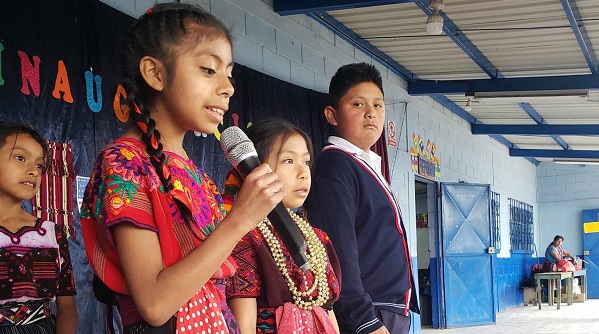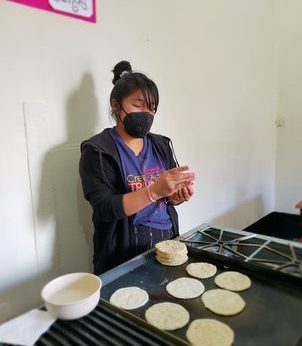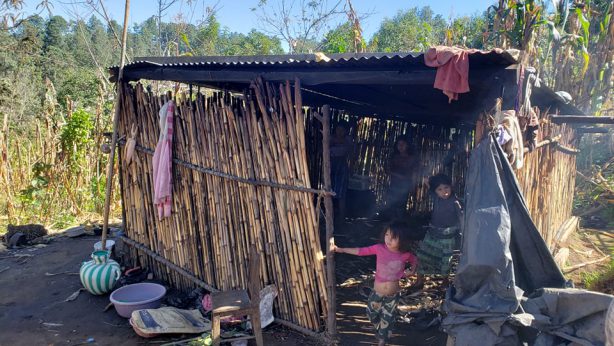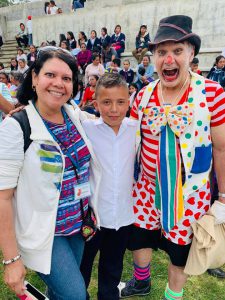Responding to a LinkedIn post from the Luis von Ahn Foundation

Education is the key to empowerment, yet indigenous women in Guatemala face significant barriers. The average years of schooling for women in Guatemala is only 5.3, and that numbers lowers to just 3 years for Indigenous women. While strides have been made in enrollment parity, quality education remains a challenge, especially in secondary education for indigenous women. Let’s work together to break down barriers and ensure every woman has access to the education she deserves.
https://www.linkedin.com/posts/luis-von-ahn-foundation_educaciaejnparatodos-empoderamientofemenino-activity-7205946817954398209-JG3N
Barriers because of GENDER:
One of the ways our organization breaks down the barriers is by creating a shift in mindset. When the president of our nonprofit (a woman) visits with the communities in Guatemala, we show an example of a woman in a leadership position. And, when there are female members of the COCODE in a rural community we are visiting, or specifically the OPF for educational settings, we take note of that and compliment the group when multiple voices and positions are heard. In a recent potable water project we supported, the water committee from Cantón Chujupén had more women than men!

As far as educational opportunities themselves, our scholarship program is currently weighted 67% female (41 out of 61 students) covering all levels of education, from primaria to university.
In our programa de becas, we stress to the parents the importance of the education that their daughters will receive and get their buy-in so that there is support from the family. Oftentimes, girls don’t have the opportunities for education not because they don’t want to take advantage but because their parents feel it is not as important as other things. Girls need to know that their educational pursuits are supported, that they are deserving students, and that the world is their oyster!
NOTE: The photo below is from our 2023 roster, but in 2024 we grew from 49 to 61 students!

In our entrepreneurship program, we also support the business ventures of women! We try to help women advocate for themselves and be capable of success in business ventures. Instilling this confidence and giving these opportunities falls under education as well, because we are teaching about business administration, accounting, and marketing — all the while building up the morale of female leadership within a community!
But, gender roles are not the main barrier to higher/secondary education in indigenous rural areas, in my opinion… it is the lack of those institutions of learning!
Barrier affecting all:
Our nonprofit works in Chichicastenango (Quiché department) as a nexus. Within the 90+ cantones in that municipality, few of them have institutions at the básico or diversificado (middle school and high school) level. So, many rural communities don’t even begin to dream beyond 6th grade because there isn’t a school of higher learning within a walking distance and few/none of the families have transportation. For some of the remote communities, there is not even access to mass transportation if the families could even afford it.
So, if you are brought up not to dream of education beyond 6th grade (for boys OR girls) then it is sometimes hard to stay focused and value the education you’re getting at the lowest level. The cycle repeats…
Case in point: one of the communities we have been supporting is Cantón Panimaché Quinto Bajo — which is so far on the outskirts of Chichicastenango that it is almost in Sololá! Because it is so remote, it is a “forgotten” community. It has an elementary school that, before COVID, had two teachers to cover all six grades, but since schools returned to “in person” only one teacher has been assigned by the Ministry of Education…. ONE TEACHER for SIX GRADES!!!
Meet the community of Panimaché Quinto Bajo:

In that small community of about 30 families, there are no professionals. All of the parents are basically day laborers. Not all of the school-age children are attending school because the parents are not stressing it and the school they have (while the teacher is excellent) does not have the other resources it needs.
In this community, we have built a health clinic, trenched a water distribution system and built two community pilas, erected a community chicken coop, donated stoves, provided a library, and bought school supplies and backpacks for the entire school population.
Our dream is to build a básico school or a specialized training center that encourages the students there to dream of a higher education — for all the girls AND all the boys.
Yes, it is important to make higher education accessible to girls. We need to break down the barriers that exist along gender lines and educate the young women of Guatemala, for they will change the world!
But, it is also important to make high education accessible to EVERYONE in Guatemala, because all kids need that fighting chance. And yes, education is the key to empowerment. Let’s put that key in all hands, so that many doors will be opened…



 The “right” opportunity arose when I learned about a travel opportunity for adoptive families which would include volunteer work and cultural sightseeing. Being members of that team had a profound impact on me, Lillian and Andrew. Not only were we able to make a real connection to our son’s birthplace, but we met incredibly warm and generous people, all of whom we now consider to be a part of our “family.” In addition to the volunteer work I shared with the Team, I also was able to “give back” by performing as my alter ego, “Farfel the Clown” at a barbecue for children of The Backyard School. It will remain one the proudest and happiest memories of my life.
The “right” opportunity arose when I learned about a travel opportunity for adoptive families which would include volunteer work and cultural sightseeing. Being members of that team had a profound impact on me, Lillian and Andrew. Not only were we able to make a real connection to our son’s birthplace, but we met incredibly warm and generous people, all of whom we now consider to be a part of our “family.” In addition to the volunteer work I shared with the Team, I also was able to “give back” by performing as my alter ego, “Farfel the Clown” at a barbecue for children of The Backyard School. It will remain one the proudest and happiest memories of my life.